Peter MALONE
Saturday, 18 September 2021 19:56
Paradise/ 2013
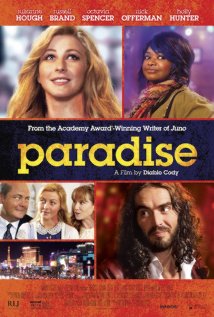
PARADISE
US, 2014, 86 minutes, Colour.
Julianne Hough, Russell Brand, Octavius Spencer, Nick Offerman, Holly Hunter, Kathleen Rose Perkins.
Directed by Diablo Cody.
Diablo Cody is best known for writing the screenplay of Juno. She also wrote Jennifer’s Body and Young Adult. Here she has written and directed Paradise.
The film has a tilt at narrow-minded religious communities in such states as Montana. The film focuses on a young woman, Lamb, played by Julianne Hough, who has experienced severe burns in a plane crash and who has lost her faith in God, and says this at a religious ceremony – where a minister had expected a good donation from the large payout that she received from insurance.
She decides to experience the world and goes off to Las Vegas which is presented in all its glitz as well is its pitfalls. Paradise is the nickname for the Strip section of Las Vegas.
The film shows on screen a list of seven sins to which she succumbs. However, she is helped by a sympathetic British barmen played in his usual eccentric style and accent by Russell Brand. Also helping is a middle-aged lounge singer, very unsuccessful, with a drinking problem, played effectively by Octavia Spencer.
Lamb goes through various experiences, succumbing to some temptations, learning lessons from others, especially the friendship of Octavia Spencer and gallantry of Russell Brand.
Holly Hunter appears in a supporting role as Lamb’s mother.
1. The title? Images of heaven? Heaven and earth? Las Vegas and its overtones?
2. The work of Diablo Cody, her screenplays, her stories about young women, direction?
3. The Montana setting, the church congregation, the contrast with Las Vegas, the Strip, Paradise, the real Las Vegas, the clubs, casinos, the touts in the street, the bars, the lounges? The feel for the city and its atmosphere? The musical score?
4. Lamb, her name, her family, the religious attitudes, Conservative? Going to the church, her parents in the congregation? The image of Lamb before the accident? The story of the fire, the plane, the crash, the pilot dying, the skin grafts and her explanation from the lectern, the huge payout? Her denunciation?
5. The parents at the church, anxious, her leaving, the return, her mother and yoga, her father and, wanting to be open-minded, but her to remain conservative? The talk, her making peace with them, her decision to go out and see the world?
6. The preacher, the introduction, the congregation, the reactions?
7. The device of listing the sins on the screen and Lamb’s experience?
8. Las Vegas, her intentions, naive, the hotel and settling in, having the plates? The big roll of cash? The tout, Amber’s photo on the card? The television
for the Chatelet on the television? The visit to the bar, the lounge, William the counter, his appearance, her talking to him, his offer of friendship, the drinks, the introduction to Loray, her singing, people booing? The talk afterwards, Loray and her hard style, not believing Lamb’s story? The raid deciding to take Lamb under her wing?
9. William, British, his look, his manner? His work at the bar, his humour? Lamb and the drink, Lamb’s story, his friendship?
10. Loray taking Lamb around the town, the loss at the poker machine, hard lessons, Loray and her continuing to drink? William finding them? Lamb being assertive, rude, going off?
11. Going to the Chatelet, in the restroom, recognising Amber, the drinking and being sick? Listening to Amber’s story, giving her the money, the cheque, the effect on her?
12. William finding her, the going to the arcade, on the high wire and the exhilaration, Loray and her Florida story, having to leave?
13. William taking her back to the hotel, her making advances, his resistance, sitting on the roof, her telling her story, William and his gallant behaviour?
14. Lamb and learning some lessons, the return home, the more quiet branching out, going travelling and seeing the world?
Published in Movie Reviews
Published in
Movie Reviews
Tagged under
Saturday, 18 September 2021 19:56
Come Live with Me
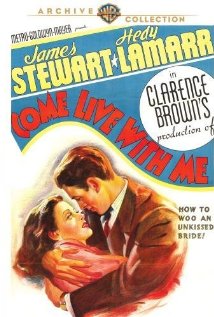
COME LIVE WITH ME
US, 1941, 86 minutes, Black-and-white.
James Stewart, Hedy Lamarr, Ian Hunter, Verree Teasdale, Donald Meek, Adeline De Walt Reynolds.
Directed by Clarence Brown.
Come Live with Me is a slight romantic story from MGM at the beginning of the 1940s. It is a star vehicle for Hedy Lamarr who was making an impact, especially at MGM. She plays a refugee from Europe who is still subject for deportation from the United States and is hiding, engaged to a married man, played by Ian Hunter. She is given a chance by the authorities to stay in the country if she marries an American.
The American turns out to be James Stewart, a rather needy writer who has received many rejections but who agrees to go through the formal marriage. Actually, the story gives him the opportunity to write a novel which is accepted by, of all people, Ian Hunter.
There are some farcical aspects, the style of the romantic comedy, with the touch of the screwball, and, of course, the happy ending. Of particular interest is the role of the grandmother, played with vigour by Adeline De Walt Reynolds.
The film was directed by Clarence Brown, a veteran of many serious and humane films at MGM.
1. Light 1940s MGM story, New York story, European background?
2. MGM production values, the director and his career, the cast, the score?
3. The title, Christopher Marlowe and his poem about the Shepherd?
4. The situation, Johnny, Hedy Lamarr, the screen presence and beauty, the death of her father, a refugee from Europe, the American government, the threat of being deported? Her relationship with Barton, in love with him, his protection, his talk of the divorce? The government officer, her straightforward response, his wanting to do something for her? The suggestion about marrying an American citizen? Her going out walking, Will on the seat, her walking on the cigarette stub, encountering him at the bar, the barkeeper keeping the dime, his protests, her verifying what he said, their being suspected of being in collusion? The clash, the talk, going to his apartment, her proposing the scheme, the effect, visiting each week, his beginning to write the novel, getting to know her, like her, then the prospect of divorce?
5. Will, from the country, living in the city, the rejection slips, the cigarette butt, the beggars in the street, the dime in the diner, Johnny and her help, his being wary, the apartment, the proposal, his decision to go with it? His writing? Posting the manuscript? Getting the wire, meeting Barton, meeting his wife, Barton and his worrying, the wife giving him $500 as an advance?
6. Barton, age, the marriage, their arrangements, love, wanting the divorce, with Johnny, at the office, his wife’s presence, his anxiety about Will?
7. Will and the trip, Johnny’s phone call, going to the farm, meeting Will’s grandmother, nice, the talk, the meal, the quiet of the country, his intention of returning? The partition and their beds, their talking, the torch?
8. Barton, arriving, upset, Johnny and her choice, and not loving Barton, the condition of his wife to take Barton back? The happy ending for Johnny and Will?
Published in Movie Reviews
Published in
Movie Reviews
Tagged under
Saturday, 18 September 2021 19:55
Whip Hand, The
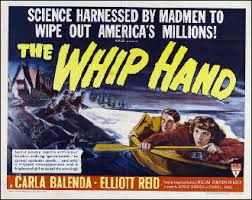
THE WHIP HAND
US, 1951, 82 minutes, Black and white.
Carla Belinda, Elliott Reid, Edgar Barrier, Raymond Burr, Otto Waldis.
Directed by William Cameron Menzies.
The Whip Hand is a small film from 1951, the era of anti-Communist feelings and activities in the United States, following on the hearings at the House for Un- American activities at the beginning of Senator Mc Carthy’s witchhunting enquiries.
A number of films were made to combat the Communist threat, small films like The Woman on Pier 13, Walk East on Beacon, in the film about Cardinal Mindzenty of Hungary, Guilty of Treason.
This film works well as a small thriller, a journalist on holidays, finding a mysterious town, and even more mysterious island with laboratories where a former Nazi doctor is doing experiments on humans, to create a virus that can be unleashed on American cities.
Elliott Reid is the journalist and Raymond Burr, doing his heavy sinister style yet again, controls the town which has been evacuated because, allegedly, a virus has destroyed the fish and it is no longer a tourist centre, thus preserving it from too close investigation.
Of particular interest is the fact that the film was directed by William Cameron Menzies, best known as a celebrated set designer, Things to Come, Reign of Terror…
1. A film of 1951, American attitudes towards Communism? Anti-Communism? Black lists, Un- American hearings? Conspiracies?
2. Black-and-white photography, the town, the island, the laboratories, the shops, hotels? The musical score? The world of newspapers?
3. Matt, fishing, his injury, driving, the hostility at the gates, looking for a doctor, in the town? The doctor and his sister, her fear? The room at the hotel, Loomis, Molly, their watching him?
4. Nate, watching Luther, the story of the lake, the virus, destroying the fish? An idea for an article? Matt investigating? Typing his article?
5. Loomis and Molly, sinister, watching, listening, smooth responses? Nate and his watching?
6. The doctor, being careful, his nervous sister, those were sick, the treatment? Luther’s death?
7. Luther, age, running the store, chatting, Nate and his intervening, the phone calls, Luther ordering the stores, communicating the message? Phone calls back, endangering him, his death?
8. Matt, curiosity about the island, taking his camera, the attack, the attackers finding the camera and destroying it?
9. Peterson, the recluse, his visit, discussions with Matt, the warnings? Offering the drink – and Matt apprehensive about poison?
10. Matt on the boat, going to the island, the laboratories and plant, seeing the Nazi scientist? Sending the message through Luther, the response of the editor, the information about the scientist?
11. The escape attempt, the boat, the doctor’s sister? Driving, being helped on the way, the woman and her driving them back?
12. The laboratories, the doctor, his human experiments, the threats, the Nazi style, for Communism? The virus, the human subjects, the tests?
13. The police arriving, the confrontation, the scientist and his threats to unleash the virus?
14. The doctor, shooting the scientist, his being shot, the group being saved?
15. A competent thriller? A film of its time to warn Americans about the Communist threats?
Published in Movie Reviews
Published in
Movie Reviews
Tagged under
Saturday, 18 September 2021 19:55
Tomorrowland
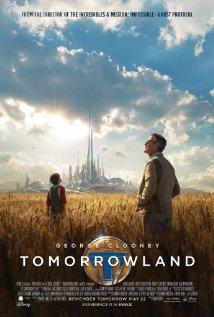
TOMORROWLAND
US, 2015, 130 minutes, Colour.
George Clooney, Hugh Laurie, Britt Robertson, Raffey Cassidy, Tim Mc Graw, Kathryn Hahn, Keegan- Michael Key, Judy Greer.
Directed by Brad Bird.
Tomorrowland is an ambitious production, large in imaginative scope, a visual delight in its re-creation of the world that is called Tomorrowland. On the other hand, it also tantalises the mind as well is the imagination, but is not always clear in its elaboration of its plot.
The film was directed and co-written by Brad Bird, who impressed people several decades ago with his animated fable, The Iron Giant. He was also responsible for two Disney animation features, The Invincibles and Ratatouille. A few years ago he moved into live action fantasy with the fourth instalment of the Mission Impossible series.
This is a Disney production and the Disney imagination, especially of Walt Disney himself, is behind Tomorrowland. The initial setting is The World Fair in New York City in 1964, Disney being one of the sponsors and creating a feature of the Fair, inviting visitors to imagine what the future might be like. For those who like this film, the suggestion is to go to You Tube and click on the short Tomorrowland video featuring Walt Disney himself and his enthusiasm and imagination for the future.
This is also a George Clooney film which gives the film some status. He first appears, talking to camera, explaining what has happened to him, with some interjections by and some banter with a young woman called Casey. As we wonder what he is talking about and to whom he is speaking, we go into flashback, back to the world of the Fair, where his character, Frank, is bringing an invention, a jet pack, to the supervisor of entries, Nix, played by a stern Hugh Laurie (who gets sterner as the story foes on). There is also a young girl, Athena, a very effective Raffey Cassidy, who is sympathetic to Frank and takes him into the Tomorrowland.
Then we move to Casey’s story in the present. Her father is a NASA scientist and Casey is upset that powers that be are dismantling projects and she tries sabotage, only to be arrested, and finds in the possessions returned to her by the police a badge, a medal, which she touches and is immediately transported into the fantasy world which is Tomorrowland.
Casey, obviously, wants to keep going into Tomorrowland but the badge battery goes flat. Fortunately, Athena turns up, still the same young age, and takes her on a journey which includes a visit to two aggressively fanatical storekeepers of memorabilia, Kathryn Hahn and Keegan-Michael? Key. Sinisterly smiling robot agents also turn up and cause mayhem.
Which brings Casey, at last, to adult Frank’s house and a series of adventures in Tomorrowland, meeting Nix again and realise that he has taken a pessimistic view of the future – which Frank has been looking at on television screens, the range of world disasters, wars, epidemics. The point is, and the message is rather hammered home, that human beings have been overwhelmed by these pessimistic perspectives and do not have the energy to pick themselves up and do something to better the world.
Frank and Casey want to do something about it, Athena not being with them any more having sacrificed herself for others, and the two go about our world, scanning every continent, all peoples, and ethnic groups, to discover and inspire agents who will create a better world, Tomorrowland in our world.
With the central characters, the film is geared to a younger audience, especially those with an enthusiasm for both science and fantasy.
1. A popular film for younger audiences? Science, fantasy, the future? Message film? The impact for adults?
2. The range of special effects, the imagination? Stunt work? The musical score?
3. The framework for the story: Frank and his talking to the camera, Casey off-screen? Their interactions, banter? Trying to tell the story?
4. The flashbacks, to 1964, to the World Fair in New York City? The recreation of the period? Costumes, design, the Fair attractions, the crowds, the feel for the event? Frank, young, with his invention, the jet pack, not quite working, his presenting his work to Nick’s, Athena and her presence? The discussions, the rejection? Athena beckoning him, his following, the boat, going into the ride, the chute and going down? Arriving in Tomorrowland? The people, the vistas, the buildings, the vehicles, travel, flying, the jet pack?
5. Nix, severe, the discussion, the rejection, his showing the visitors around, his plans?
6. Athena and Frank, liking each other, the attraction, her disappearance? The effect on Frank? His continuing to work for Tomorrowland, building, his being ousted? His growing up, in middle age, alone, in his house, the range of machines, surveillance, being cautious?
7. The story of Casey, her little brother, her father and his work for NASA, the demolition and her rejection of it, going by bike, disguised, in the night, the attempts at sabotage, her arrest, in jail, the bail, her possessions, finding the medal?
8. Touching it, going into Tomorrowland, the distant city, the fields, her moving in and out? Experiencing the various bumps, in the water?
9. Athena, her appearance, not older, Casey, the battery flat in the medal her determination to go to Texas?
10. Arriving at the shop, the range of goods, nostalgia, the medal, robots? The two characters, comic style, menace, the attack, the fire? The robot police arriving, then mechanical smiles? The police arriving, the puzzles?
11. Athena and Casey, the escape, in the car, asleep, talking, Athena dropping Casey off, to find Frank? The house, the defences? Casey and Frank interacting? In the house, his machines, the arrival of the Robot police, fleeing, the house burnt?
12. The quest, going to Tomorrowland? Nix and his control, their experiences with him?
13. The message of time running out for humanity, the images of the deteriorating world, the media feeding these ideas to people, the atmosphere of despair? Yet hope? Nix, his attitude, pessimistic?
14. The message of people not heeding, therefore not prepared to do anything?
15. The confrontations, Frank and Casey, and Nix? Flight, explosions? The doorway to the real world?
16. On the beach, And Nix being crushed?
17. Frank and Casey, with Athena, the recruiting, people who wanted to do good?
18. Athena, as a machine, intelligent, humour, the possibility of laughing, the bond with Frank, with Casey? Her sacrificing herself for the others?
19. The recruits, the international range, multi-ethnic, the aspect of need in our world, hope for the future? Tomorrowland in the real world?
Published in Movie Reviews
Published in
Movie Reviews
Tagged under
Saturday, 18 September 2021 19:55
Guilty of Treason
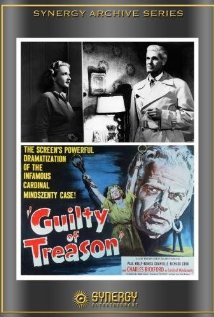
GUILTY OF TREASON
US, 1950, 90 minutes, Black-and-white.
Charles Bickford, Paul Kelly, Bonita Granville, Elizabeth Risdon.
Directed by Felix E. Feist.
Guilty of Treason is a film of its time, 1950, the early years of the Iron Curtain, the growing hostility between the Soviet Union and the United States, the years prior to the death of Stalin. This period was noted for its hostility to the Catholic Church and the arrest of several of the ecclesiastical leaders, including Cardinal Joseph Minzenty of Hungary.
Many of the films of the time served as propaganda pieces against Communism, are relevant to the blacklisting in Hollywood, the hearings by Senator Joseph Mc Carthy as well as the contemporary House of Un American Activities hearings.
Paul Kelly plays a journalist, formerly based in Moscow and questioning authorities there, visiting Budapest and investigating the situation of Cardinal Mindzenty. He comes across a young woman, a teacher, played by Bonita Granville, who is in love with a Soviet official, Richard Derr.
The Cardinal is played by Charles Bickford with a blend of dignity, Church loyalty as well as farming and peasant background. There is a scene where he is visited on his farm by the journalist and the teacher, an opportunity for him to tell his story, meet his peasant mother, work on a farm, his love for being a parish priest, his taking his responsibilities as Primate of the church in Hungary very seriously.
When he is arrested, he is interrogated, especially about loyalties to the state, questions from Hungarian officials as well as an observer from Moscow. There are scenes of his being tortured, stood in the spotlight to answer questions, the physical and psychological conditioning – but he had written a document earlier warning people to be careful about what he said under the pressure of torture. He is accused in the court, found guilty, imprisoned. For dramatic purposes, the teacher is also arrested and seriously interrogated and tortured, probably finishing in the Gulags.
Comparisons can be made with the 1955 film by Peter Glenville, The Prisoner, a dramatic account by playwright Bridget Boland on the plight of Cardinal Minzenty, but filmed as a piece of contemporary fiction.
With the Hungarian uprising in 1956, the Cardinal was able to take refuge in the American embassy where he stayed for a decade before detente between eastern Europe and the Vatican enabled him in the 1960s to go to Rome.
1. A film of 1950? Propaganda? Anti-Communist? Supportive of the Catholic Church, of Cardinal Mindzenty?
2. The aftermath of World War II, alliance with Russia during the war, the coming down of the Iron Curtain, the closure of Eastern Europe, the different countries becoming satellites of Russia?
3. The Stalinist regimes, one state, complete loyalty, secret police, prison for dissent, torture, the gulags?
4. The American attitude, the big lift in Berlin, themes of freedom, the work of the journalists, diplomacy? The exposé in articles and books?
5. The framework? For the Mindzenty story? Tom Kelly, in Moscow, in Budapest, his book, his lecture, exhortations?
6. The context for the Mindzenty story? The attack on the Catholic Church, and especially Catholics schools?
7. The visit by Kevin and Stevie, the Cardinal, at the farm, his peasant background, German name, changing his name to that of the village he came from? his mother, remembering his time as parish priest, his role as Cardinal? His decisions, preparation for the arrest, his document warning about confessions and torture? In prison, the spotlight on him and his interrogation? Considered subversive, questions about loyalty to the state? The torture? The effect of torture? His stances on charity, justice and freedom? Love for his country, love for the church, the scenes in court, his mother’s presence? His prison sentence?
8. Tom, the encounter with Stevie, her story, not Catholic, love for Alex, her work in the school, the challenge to understand liberty, organising visit to the cardinal? The scenes with Alex, the love, the risk, the torture, imprisonment?
9. Tom, with Alex, with Stevie? His being bashed, saved?
10. Alex, loyalty, love for Stevie, his conscience, her arrest, his career?
11. The presentation of the Russian official, diplomacy, his presence in the interrogations? The local Polish officials and the pressure?
12. The film in the light of the history of the cardinal in the American Embassy, going to Rome? The Hungarian uprising in 1956?
Published in Movie Reviews
Published in
Movie Reviews
Tagged under
Saturday, 18 September 2021 19:55
Details, The
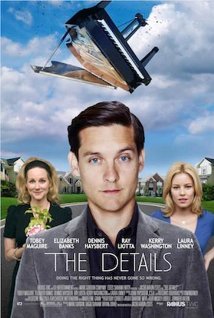
THE DETAILS
US, 2011, 91 minutes, Colour.
Tobey Maguire, Elizabeth Banks, Laura Linney, Dennis Hayesbert, Ray Liotta, Kerry Washington.
Directed by Jacob Aaron Estes.
The Details is a mixture of the comic and the serious, and ironic fable about contemporary living.
The stories told from the point of view of a doctor, Jeff, Tobey Maguire, who has been married 10 years to his wife, Elizabeth Banks, and they have a son. All seems to be going well.
At the beginning, Jeff gives an indication and some clues as to what might happen. He is involved in unlawful extensions of his house, the lawn dug up by raccoons, his eccentric neighbour, Laura Linney, who dotes on her cats, makes some complaints to the authority but gets more involved with the doctor than we might have imagined. Jeff makes a number of stupid mistakes, including having a one night stand with his friend’s wife (Ray Liotta and Kerry Washington), but does good turns for a basketball coach, Dennis Hayesbert, finding him a job as well is donating a kidney.
Jeff gets himself into all kinds of tangles and there is a surprising, brutal solution to his main problem – followed by confessions and everything seeming to go back to order.
The film was directed by Jacob Aaron Estes who wrote the screenplay and made a name for himself and 2004 with Mean Creek.
1. The blend of the serious and comic? Reality and touches of absurdity?
2. Washington State, Seattle? Ordinary situations, homes and gardens, the neighbour next door? Playing basketball? Surgery? The bars, the building sites, the river and the bridge? The musical score?
3. The title, the plot, the characters?
4. Jeff and his narrative, his explanation of the clues, the symbolic nature? His attitudes, observing life, the final moralising?
5. Jeff’s story, his age, 10 years married, love for his wife, his son, his job as a doctor? Recreation and playing basketball? The racoons and the destruction of the lawn, his bending the rules about his house development? Buying the poison? His attitude towards Lila, placating her, the story of the cat, his paying for the cleaning of the house, wanting her not to report to the authorities? The dead cat? The sexual encounter? Her pregnancy? His kindness towards Lincoln, finding out about the job, at the school? Going to the meal at Lincoln’s house? Telling him his dream about the arrow? The death of Lila? Peter and his wife, the celebration of Jeff’s 10 years of marriage? Jeff going to see Rebecca, the discussion, drinking, the past, the sexual encounter, his carelessness in leaving the coat? Peter and taking him to the river, the confrontation, getting the money, scattering the cash over the river? Jeff and his friendship with Lincoln, Lincoln and the need for a kidney, Jeff doing the research, the compatibility, Nealy agreeing, his giving of his kidney to Lincoln?
6. Nealy, loving wife, 10 years, the discussions with Jeff, about the lawn? Love for her son? The meal at Lincoln’s house? Lila’s death? The final discussion, the truth, the confession of the affair? Reconciliation? At the end, pregnant?
7. Lincoln, basketball, his talent, the injury, playing with Jeff, his work on the building site, accepting the job at the school, the meal at his home? His gratitude towards Jeff for the gift of the kidney? His indebtedness? The arrow, killing Lila?
8. Lila, eccentric, the rules about house extensions, the returns? Her fussing over her cat? Discussions with Jeff, the cleaning of the house? Her amorous approach? The death of the cat and its ritual? Going to his office, hearing the truth, her pregnancy? Her death?
9. Rebecca, the past, the sexual encounter, separation from her husband? Peter, his work, his accosting Jeff, the clue of the coat, on the river, his decision to scatter the money?
10. The end, Jeff and his destiny, fate, the keeping of the secrets, the motivations? With his wife and her being pregnant?
Published in Movie Reviews
Published in
Movie Reviews
Tagged under
Saturday, 18 September 2021 19:55
Sporting Blood/ 1940
SPORTING BLOOD
US, 1940, 82 minutes, Black and white.
Robert Young, Maureen O' Sullivan, Lewis Stone, William Gargan, Lynne Carver, Clarence Muse, Lloyd Corrigan, Russell Hicks.
Directed by S. Sylvan Simon.
Sporting Blood is a star vehicle for Robert Young and for Maureen O’ Sullivan, who had appeared as Jane in the Tarzan films with Johnny Weissmuller. Lewis Stone was appearing as Judge Hardy in the series of the time. William Gargan offers good support as Robert Young’s friend.
This is a racing film, clips of races, horse training, criminal activity on the courses. However, the film has some complicated moral issues, Robert Young is the son of a father who had run off with the wife of a prominent landowner. He decides to return home, to his dilapidated mansion, and raise a loan to breed horses. The landowner, played by Lewis Stone, eventually decides to give him the money with the mansion as collateral. His two daughters are interested in Young, but it is the hostile daughter, Maureen O’ Sullivan, who does fall in love and raises complications with her father.
The film is also interesting in terms of the character played by Clarence Muse, the black domestic servant who identifies with his master and even sets fire to Young’s stables, thinking that this is what the master wants.
A film of its time, but interesting enough if one comes across it.
1. Racing story, breeding, training, the races, betting?
2. MGM 1940, the cast, black and white photography, the score?
3. The status of racing by 1940, the visuals, the horses, the owners, the trainers, the jockeys? Criminal elements?
4. Myles and Duffy, at the races, owning the horses, the threats from the criminals, the accident during the race, Myles punching out his enemy? The decision to return to Virginia?
5. The history in Virginia, Myles’ father, running off with Lockwood’s wife? Their deaths in the accident? The hostility of the town towards Myles?
6. The mansion, in ruins, Myles and Duffy settling in? The horses, the breeding, the care?
7. The request for the loan, the bank refusing, the influence of Lockwood? Lockwood, meeting Linda and Joan, hostility? Lockwood and his decision to extend the loan, the mansion as collateral?
8. Joan, flirting, her boyfriend, relationship with her father, with Linda, the clashes, reconciliation, Myles proposal, whether to marry him or not, her leaving?
9. Duffy, the good friend, good advice, training the horses, care, exasperation with Myles?
10. The character of Jeff, the domestic servant, in the tradition of the mansion slave, the bond with the master, and Jeff setting fire to the staples thinking that this was what Lockwood would want?
11. Linda, the hostile meeting, the visit, her attraction, the fire and her coming to help? The birth, the death of the cold and letting Sweetheart live, difficulties and Linda’s assistance?
12. Myles, his attitudes, wanting to win, the lost horses in the fire? Linda, her horse, the training, the carriage and the horse pulling it, success?
13. The sudden marriage, the motivations, Linda’s love, having to leave, with her father? Myles, the clashes with Duffy, coming to his senses?
14. The race, everyone cheering on, the horse winning? And reconciliation?
US, 1940, 82 minutes, Black and white.
Robert Young, Maureen O' Sullivan, Lewis Stone, William Gargan, Lynne Carver, Clarence Muse, Lloyd Corrigan, Russell Hicks.
Directed by S. Sylvan Simon.
Sporting Blood is a star vehicle for Robert Young and for Maureen O’ Sullivan, who had appeared as Jane in the Tarzan films with Johnny Weissmuller. Lewis Stone was appearing as Judge Hardy in the series of the time. William Gargan offers good support as Robert Young’s friend.
This is a racing film, clips of races, horse training, criminal activity on the courses. However, the film has some complicated moral issues, Robert Young is the son of a father who had run off with the wife of a prominent landowner. He decides to return home, to his dilapidated mansion, and raise a loan to breed horses. The landowner, played by Lewis Stone, eventually decides to give him the money with the mansion as collateral. His two daughters are interested in Young, but it is the hostile daughter, Maureen O’ Sullivan, who does fall in love and raises complications with her father.
The film is also interesting in terms of the character played by Clarence Muse, the black domestic servant who identifies with his master and even sets fire to Young’s stables, thinking that this is what the master wants.
A film of its time, but interesting enough if one comes across it.
1. Racing story, breeding, training, the races, betting?
2. MGM 1940, the cast, black and white photography, the score?
3. The status of racing by 1940, the visuals, the horses, the owners, the trainers, the jockeys? Criminal elements?
4. Myles and Duffy, at the races, owning the horses, the threats from the criminals, the accident during the race, Myles punching out his enemy? The decision to return to Virginia?
5. The history in Virginia, Myles’ father, running off with Lockwood’s wife? Their deaths in the accident? The hostility of the town towards Myles?
6. The mansion, in ruins, Myles and Duffy settling in? The horses, the breeding, the care?
7. The request for the loan, the bank refusing, the influence of Lockwood? Lockwood, meeting Linda and Joan, hostility? Lockwood and his decision to extend the loan, the mansion as collateral?
8. Joan, flirting, her boyfriend, relationship with her father, with Linda, the clashes, reconciliation, Myles proposal, whether to marry him or not, her leaving?
9. Duffy, the good friend, good advice, training the horses, care, exasperation with Myles?
10. The character of Jeff, the domestic servant, in the tradition of the mansion slave, the bond with the master, and Jeff setting fire to the staples thinking that this was what Lockwood would want?
11. Linda, the hostile meeting, the visit, her attraction, the fire and her coming to help? The birth, the death of the cold and letting Sweetheart live, difficulties and Linda’s assistance?
12. Myles, his attitudes, wanting to win, the lost horses in the fire? Linda, her horse, the training, the carriage and the horse pulling it, success?
13. The sudden marriage, the motivations, Linda’s love, having to leave, with her father? Myles, the clashes with Duffy, coming to his senses?
14. The race, everyone cheering on, the horse winning? And reconciliation?
Published in Movie Reviews
Published in
Movie Reviews
Tagged under
Saturday, 18 September 2021 19:55
Dirty Dancing: Havana Nights

DIRTY DANCING: HAVANA NIGHTS
US, 2004, 86 minutes, Colour.
Diego Luna, Romola Garai, Sela Ward, John Slattery, Jonathan Jackson, January Jones, Mika Boorem, Patrick Swayze.
Directed by Guy Ferland.
Sixteen years between the very popular original and the sequel does not seem to be a good sign.
This one is just a time passer. Set in the Havana casinos in the late 50s, just before Castro’s revolution and the ousting of Battista, it is the story of a poor young man who has a talent for dancing but works in the grounds of a big hotel. He comes across a young American going to school in Havana while her father works in a local company. Her mother had been a professional dancer but is now very protective of her daughter.
If a screenwriting class were given this basic scenario and told to do a treatment in half an hour, what would they come up with? The boy is poor, his brother a revolutionary desperate to avenge his father; he gets sacked. The girl has a date with the son of the company owner who drunkenly comes on to her and she resists, helped by the poor boy who then teaches her some Latin American dance moves. They secretly enter the New Year’s Eve competition. They practice a lot – and are helped by Patrick Swayze looking older than he did in the original set decades later. The competition is held, the revolution is successful – but do they win? And that is, in fact, more or less what happens.
Diego Luna made an international impact in Y Tu Mama Tambien and has appeared in Frieda, Open Range and The Terminal. British Romola Garai is the would-be dancer. It is a slight entertainment.
1. A popular story? 16 years after the original? The presence of Patrick Swayze? Dance, Cuba, the touch of the exotic?
2. Cuban locations, the title, Havana, the luxury hotel, the views of the city, poor areas, the beach, the competitions?
3. The musical score, the range of songs, the dancing?
4. The film using a former, the variation on Romeo and Juliet, dancing, love, rebellion?
5. The setting, 1958, before the revolution? intimations of rebellion, the rebels going into action? The relationship between Cuba and the United States pre-Castro?
6. The family, the parents, the daughters, the parents in the past, the dancing, the mother giving it up? The country club style? The work in Havana, American companies? The white Americans and their sense of superiority, putting down others? The parents with the children? The children’s behaviour, the reaction to the dance competition, embarrassment, the mother and her being stern, change of heart?
7. The sisters, Katey, wearing the cardigan, quiet, reading the books, going to Radcliffe? Joining with the young people, the reaction to the racist putdown? Javier and his accident, his work, Katey apologising, the tension, seeing him dancing, joining in, the visit to his mother, the presence of his brother and the revolution? Going out with him, their being seen, the girls reporting him and his losing his job? The proposal about the competition, the many scenes of practice? Falling in love, the effect? Susie and her reaction, apology for reporting Javier, the reconciliation, the joining in the practices?
8. Javier, his family, his older brother, his father’s death, the mother and support? The revolution, his brother, looking down Javier and his work? As a character, the initial reaction to Katey, the dancing, the attraction, falling in love?
9. The country club types, the luxury hotel, at the pool, the looking down on the locals? The visit to the club? James and Katey’s mother’s approach? Hopes? The visit to the club, going to the dancing, his attempt to kiss her, her repelling him?
10. The competition, the dancing, in the final selection of three couples?
11. The final of the competition, the outbreak of the revolution, people fleeing?
12. Meeting with Javier, knowing that he had to stay, the Cuba was his home, that she had to leave, the sexual liaison? The separation? Her mother’s supporting her, acknowledging what heartbreak was?
13. Popular entertainment, relying on the title from the original?
Published in Movie Reviews
Published in
Movie Reviews
Tagged under
Saturday, 18 September 2021 19:55
Amour de Jeunesse/ Goodbye First Love
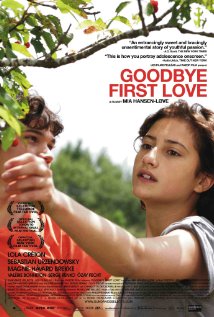
AMOUR DU JEUNESSE/ GOODBYE FIRST LOVE
France, 2011, 110 minutes, Colour.
Lola Creton, Sebastian Urzendowski, Magne Havard Brekke.
Directed by Mia Hansen Love.
Writer-director Mia Hansen Love was not yet thirty when she made this film, after success with her earlier films, especially, The Father of My Children. In interviews, she has remarked that her films have autobiographical elements, this one in particular.
This is the story of Camille, a fatalistic romantic even as a school girl. She is in a relationship with a photographer, whose name is, rather unexpectedly, Sullivan, and declares her undying love. He however, wants some time away, to go to South American with friends and be himself. He still loves Camille but not that much. She, on the other hand, pines for him.
Eventually, she has to do something with her life. She studies and, as the years pass and Sullivan does not return, she becomes an architect, quite a creative architect, and attracts the attention of her (married) Norwegian professor. It is rather a long time rebound, but for some years, they have a relationship.
One day, she encounters Sullivan’s mother in a bus and finds that he has returned some years earlier and is living in Marseilles.
The main question of the last part of the film when Sullivan and Camille resume their relationship (and Camille shows she is adept at concealment and deception) is whether this new phase can last or this is the bitter-sweet conclusion.
The film is very French in that concentrated focus on serious characters and intense emotions. Lola Creton has to age from fifteen to her late twenties. It was a surprise to find that, though she looked older earlier in the film, she was only eighteen at the time of production. German Sebastian Urzendowski is the dark handsome Sullivan who is really out of his depth in dealing with Camille. Magne Havard Brekke is the rather egotistical professor.
The success of the film’s impact will depend on whether we can identify with Camille, her passions and her sadness, or whether she just seems obsessed and sad, and we wish she would grow out of it. But, this is how so many French dramas deal with such emotional stories.
1. A French love story? The director, young, autobiographical aspects? French style and tone? The story of relationships?
2. The city locations, Paris, Marseille? Homes, the later sequences and architecture?
3. The French title? Youth and love? The English title with the emphasis on the goodbye?
4. Camille, her age, at home, her mother, her love for Sullivan, devoted? The meetings, the discussions about his travel?
5. Sullivan, his home, family, the photography, relationship with Camille, wanting to travel, with his friends, the discussions with Camille, her not wanting him to go? His decision to leave, the promise to return?
6. The years passing, Camille, as an architect, her relationship with Lorenz? Her success, relationship, no news of Sullivan? Meeting his mother, renewing the acquaintance, on and off?
7. Sullivan, his staying away, Latin American travel, his photography, the years passing, his return, not contacting Camille? Their meeting, tentative, the possibilities, being together, Camille’s love for him? His not being able to stay with her?
8. The decision, the impact on each of them? Their future? The effect of a first love?
Published in Movie Reviews
Published in
Movie Reviews
Tagged under
Saturday, 18 September 2021 19:55
Windtalkers
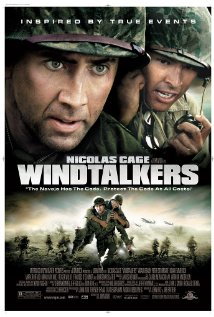
WINDTALKERS
US, 2002, 138 minutes, Colour.
Nicolas Cage, Adam Beach, Peter Stormare, Noah Emmerich, Mark Ruffalo, Brian Van Holt, Martin Henderson, Roger Willie, Frances O'Connor, Christian Slater, Jason Isaacs, Holmes Osborne.
Directed by John Woo.
In his Hong Kong films, director John Woo proved that he was a master of action. In the US, he made Hard Target, Broken Arrow and, particularly, Face/Off, before making Mission Impossible 2. But one of his Hong Kong films, Bullet in the Head, was a particularly vivid picture of the Vietnam War, offering a different perspective from the American films.
Now he has gone back to war with Windtalkers. Telling the story of a group of Navajo Indians whose language was used to create a code that was impossible for the Japanese to break, it takes us first of all to the battle of Guadalcanal. Here the focus is on Nicolas Cage as a unit leader who loses all his men in close combat and who returns to Hawaii with an ear defect and bitter attitudes. He is recruited to protect the Navajos in action so that they will be able to get messages through.
While the plot is interesting on paper, the second half of the film is gruelling to watch. It re-enacts in vivid post Saving Private Ryan intensity and detail, the step by step taking back of the island of Saipan from the Japanese. It opens in There is only so much war that one wants to and can watch during a two hour film. The cast does its best with Adam Beach as the main Navajo and Christian Slater as a windtalker guardian.
1. The impact of films about World War II? After so many decades? The war in the Pacific? American involvement? The Solomons and its strategic importance? The invasion of Saipan, pushing back the Japanese?
2. John Woo as a director, his Hong Kong films, gangster films, Vietnam war films? His career in the United States? His return to China for Chinese history? The blend of action and personal story?
3. The film coming soon after Saving Private Ryan, and The Thin Red Line, similarities?
4. The battle sequences, the way they were staged, spectacular, realism? The men, in action, weapons, bullets, bayonets, grenades, flamethrowers? The effect on them, on the enemy?
5. The stunt work, the advances of the men, the many deaths, the wounded? Acts of heroism?
6. The emphasis on the physical, close-ups, the many deaths, the War Graves, the wounded, hand-to-hand conflict?
7. The title, the focus on the Navajo, the men, the traditions, cultural, religious, linguistic? The code for American military use? The interpreters, their training, the code not being broken? The tribute to the success of the code?
8. Joe, Nicolas Cage, his story as a framework? The balance between his heroism and winning the war and the story of the windtalkers? Seeing him in action, in the Solomons, the soldiers, the many deaths, trauma, wounded, his grief? In hospital, Solomons? Rita and her attention, his determination to stand, to walk, for rehabilitation? His friendship and bonding with Rita?
9. The officers, his being given a task with the interpreters, his reaction, obeying orders? The importance of saving the code, even above the lives of the interpreters?
10. The Navajo, the reservation, Ben in himself, his leadership, love for his wife, his son, his picture and writing letters to him? Charley Whitehorse, his character? As Native Americans? In the context of the 1940s? The interviews, their ambitions, their work on the code, translations? Their being accepted, the effect, their pride?
11. The chosen squad, the variety of personalities, together, waiting, morale, playing cards, Ben playing, Charlie and his music? Joe and his sullen presence?
12. Private Chick, his character, bigotry, language, the insults, saying that the Navajo looked like the Japanese? The response of the others?
13. Shipping out to Saipan, the logistics, terrain, the Japanese, in the hills, firing, the trenches, the foxholes, the gun turrets? The difficulties of the mission?
14. The General, his leadership, interactions with the men – and his later being wounded, his death?
15. Sgt Anderson, his place in the group, his being the protector of Charley Whitehorse, his participation in the battles, his death?
16. Progress on taking the hill, keeping undercover, out of firing range, the dead and wounded, the details?
17. Ben, the importance of his sending the messages? The irony of the Americans and their cannons, finally firing on their own men?
18. Private Chick’s suggestion of Ben looking Japanese, the plan to put on the Japanese uniform, recover the Japanese radio, Joe and his courage in
retrieving it? The officer, the medal, Joe giving it to the other soldier to take home to the widow of the heroic young man?
19. The young man, his fears, carrying his comrades, being killed?
20. Overrunning the Japanese, the hand-to-hand fighting? The capture of Charlie, the prospect of his being tortured, Joe shooting him, the protection of the code? The effect on Ben? His anger and upset?
21. The aftermath of the war? Ben returning home, reunited with his family, his pride, achievement?
22. The final credits and the tribute?
Published in Movie Reviews
Published in
Movie Reviews
Tagged under